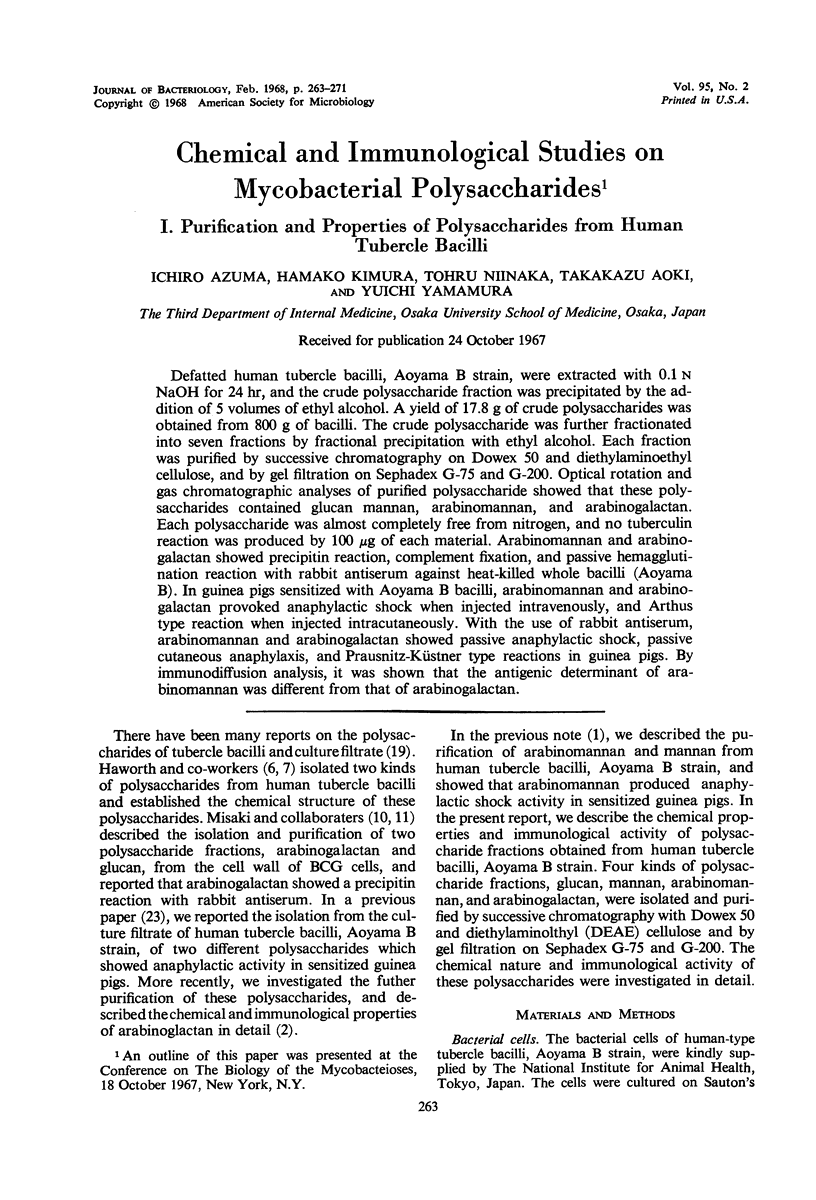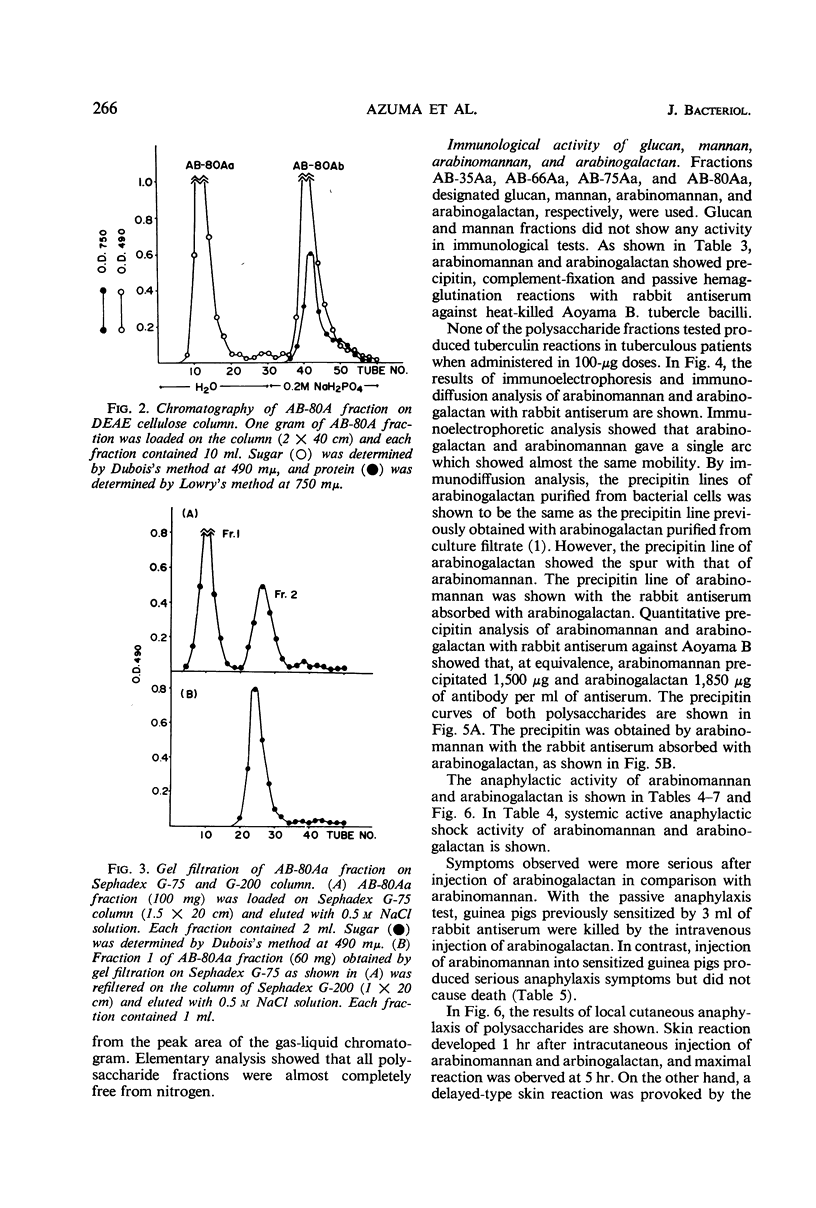Abstract
Defatted human tubercle bacilli, Aoyama B strain, were extracted with 0.1 n NaOH for 24 hr, and the crude polysaccharide fraction was precipitated by the addition of 5 volumes of ethyl alcohol. A yield of 17.8 g of crude polysaccharides was obtained from 800 g of bacilli. The crude polysaccharide was further fractionated into seven fractions by fractional precipitation with ethyl alcohol. Each fraction was purified by successive chromatography on Dowex 50 and diethylaminoethyl cellulose, and by gel filtration on Sephadex G-75 and G-200. Optical rotation and gas chromatographic analyses of purified polysaccharide showed that these polysaccharides contained glucan mannan, arabinomannan, and arabinogalactan. Each polysaccharide was almost completely free from nitrogen, and no tuberculin reaction was produced by 100 μg of each material. Arabinomannan and arabinogalactan showed precipitin reaction, complement fixation, and passive hemagglutination reaction with rabbit antiserum against heat-killed whole bacilli (Aoyama B). In guinea pigs sensitized with Aoyama B bacilli, arabinomannan and arabinogalactan provoked anaphylactic shock when injected intravenously, and Arthus type reaction when injected intracutaneously. With the use of rabbit antiserum, arabinomannan and arabinogalactan showed passive anaphylactic shock, passive cutaneous anaphylaxis, and Prausnitz-Küstner type reactions in guinea pigs. By immunodiffusion analysis, it was shown that the antigenic determinant of arabinomannan was different from that of arabinogalactan.
Full text
PDF








Images in this article
Selected References
These references are in PubMed. This may not be the complete list of references from this article.
- Azuma I., Kimura H., Ninaka T., Yamamura Y. Isolation and purification of anaphylactically active polysaccharide from human tubercle bacilli. J Bacteriol. 1967 Feb;93(2):770–771. doi: 10.1128/jb.93.2.770-771.1967. [DOI] [PMC free article] [PubMed] [Google Scholar]
- Azuma I., Kimura H., Yamamura Y. Further purification of polysaccharides having anaphylactic activity from culture filtrate of human tubercle bacilli. Am Rev Respir Dis. 1967 Sep;96(3):536–538. doi: 10.1164/arrd.1967.96.3.536. [DOI] [PubMed] [Google Scholar]
- BAER H., CHAPARAS S. D. TUBERCULIN REACTIVITY OF A CARBOHYDRATE COMPONENT OF UNHEATED BCG CULTURE FILTRATE. Science. 1964 Oct 9;146(3641):245–247. doi: 10.1126/science.146.3641.245. [DOI] [PubMed] [Google Scholar]
- LOWRY O. H., ROSEBROUGH N. J., FARR A. L., RANDALL R. J. Protein measurement with the Folin phenol reagent. J Biol Chem. 1951 Nov;193(1):265–275. [PubMed] [Google Scholar]
- MOORE S., STEIN W. H. Chromatography of amino acids on sulfonated polystyrene resins. J Biol Chem. 1951 Oct;192(2):663–681. [PubMed] [Google Scholar]
- Misaki A., Yukawa S. Studies on cell walls of Mycobacteria. II. Constitution of polysaccharides from BCG cell walls. J Biochem. 1966 May;59(5):511–520. doi: 10.1093/oxfordjournals.jbchem.a128335. [DOI] [PubMed] [Google Scholar]
- Misaki A., Yukawa S., Tsuchiya K., Yamasaki T. Studies on cell walls of Mycobacteria. I. Chemical and biological properties of the cell walls and the mucopeptide of BCG. J Biochem. 1966 Apr;59(4):388–396. doi: 10.1093/oxfordjournals.jbchem.a128314. [DOI] [PubMed] [Google Scholar]
- OKADA Y., MORISAWA S., SYOJIMA K., KITAGAWA M., NAKASHIMA S., YAMAMURA Y. IMPROVED METHOD FOR THE ISOLATION AND PROPERTIES OF TUBERCULIN ACTIVE PEPTIDES. J Biochem. 1963 Dec;54:484–490. doi: 10.1093/oxfordjournals.jbchem.a127820. [DOI] [PubMed] [Google Scholar]
- OVARY Z. Immediate reactions in the skin of experimental animals provoked by antibody-antigen interaction. Prog Allergy. 1958;5:459–508. [PubMed] [Google Scholar]
- SCHEIDEGGER J. J. Une micro-méthode de l'immuno-electrophorèse. Int Arch Allergy Appl Immunol. 1955;7(2):103–110. [PubMed] [Google Scholar]
- STAVITSKY A. B. Micromethods for the study of proteins and antibodies. II. Specific applications of hemagglutination and hemagglutination-inhibition reactions with tannic acid and protein-treated red blood cells. J Immunol. 1954 May;72(5):368–375. [PubMed] [Google Scholar]
- YAMAMURA Y., OKADA Y., NAGAMATSU S., IMADA T. THE ISOLATION FROM TUBERCULIN OF TWO DIFFERENT POLYSACCHARIDES HAVING ANAPHYLACTIC ACTIVITY. THEIR CHEMICAL AND BIOLOGIC PROPERTIES. Am Rev Respir Dis. 1965 Jun;91:839–845. doi: 10.1164/arrd.1965.91.6.839. [DOI] [PubMed] [Google Scholar]




